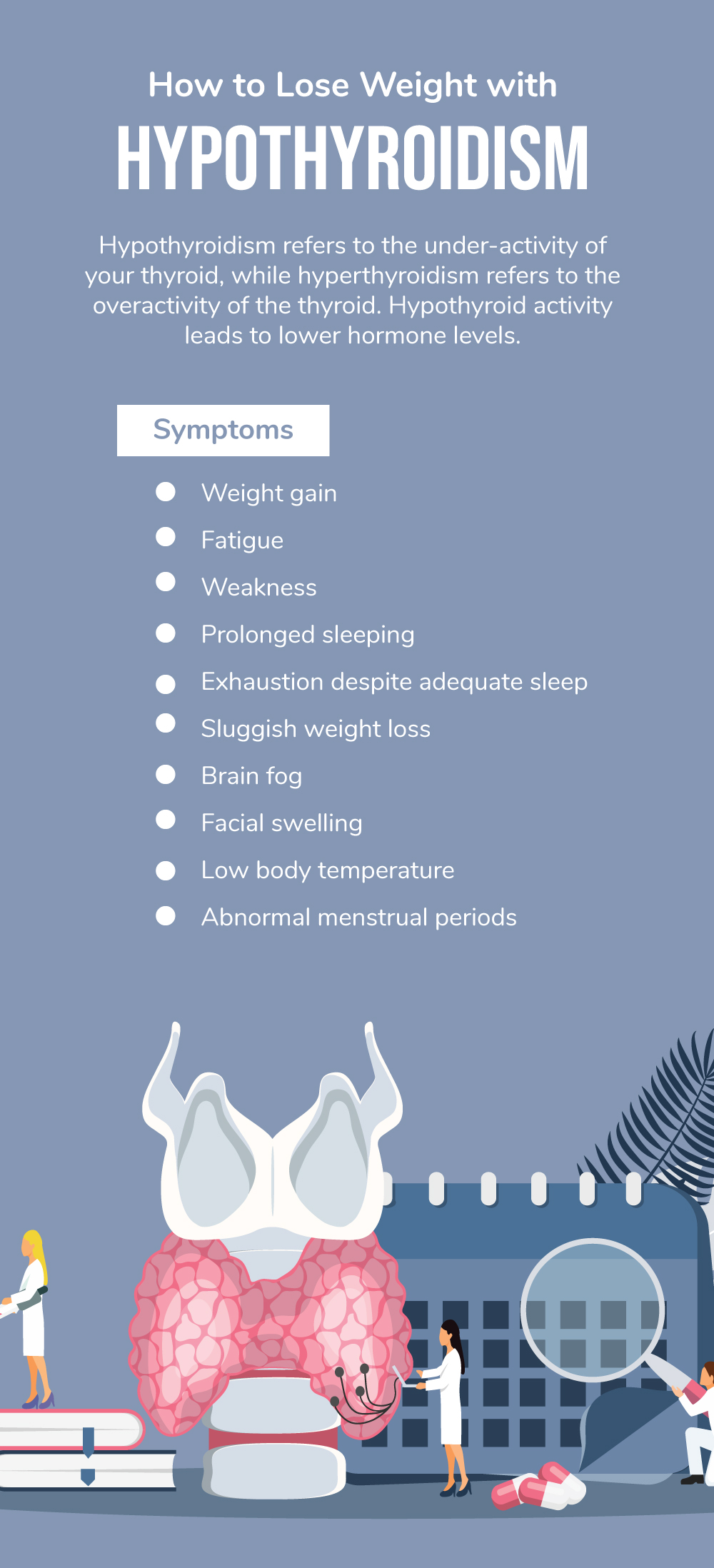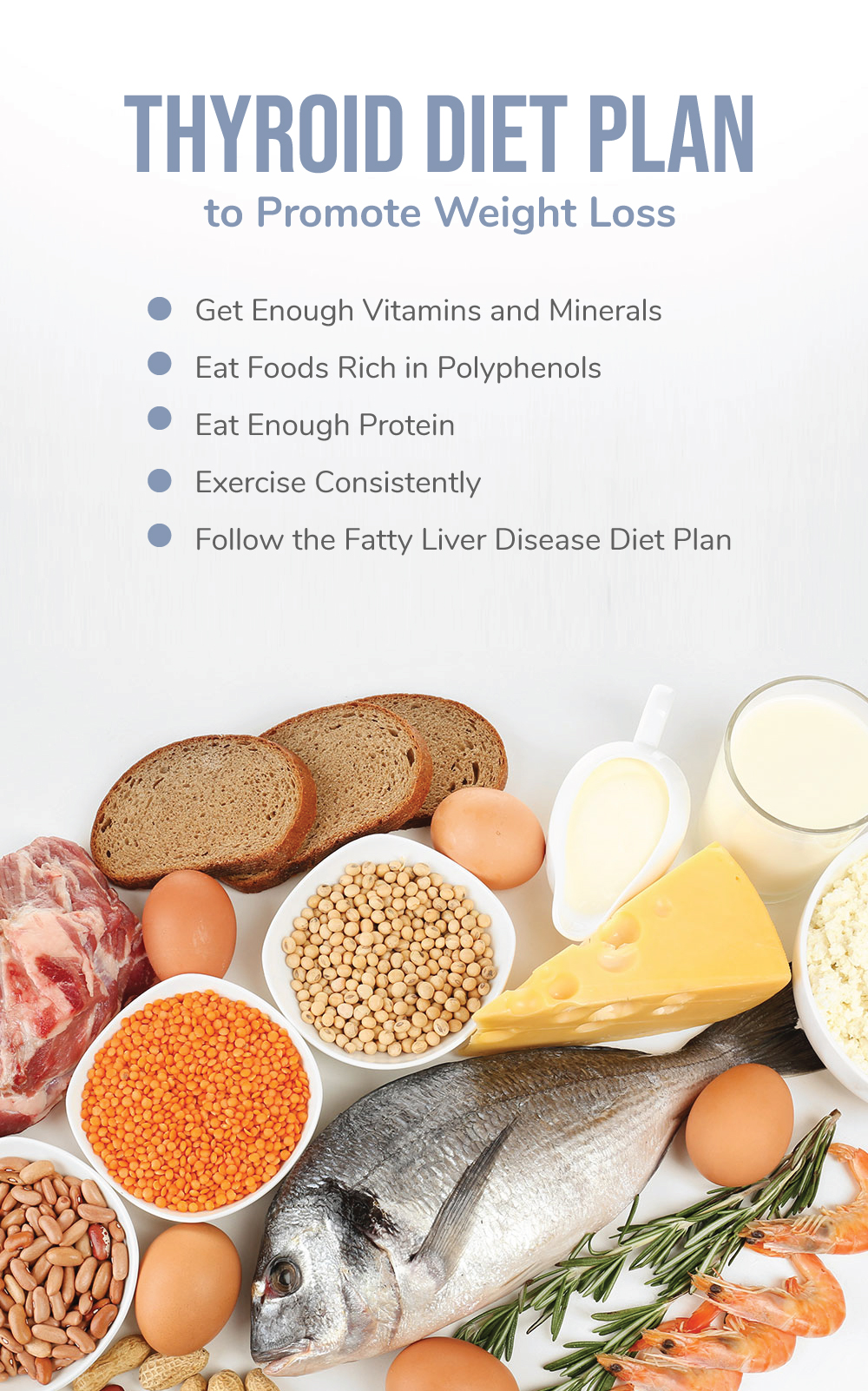Hypothyroidism is a common condition that is associated with fatty liver disease. If you’re struggling with fatty liver disease and trying to lose weight, hypothyroidism can hinder your progress. Keep reading to learn what it means to have hypothyroidism, how it’s associated with fatty liver disease, and how to lose weight with hypothyroidism.
What Is Hypothyroidism?
Hypothyroidism refers to the under-activity of your thyroid, while hyperthyroidism refers to the overactivity of the thyroid. Hypothyroid activity leads to lower hormone levels.
Let’s first examine the function of the thyroid. Located in your neck, the thyroid is a small organ in the endocrine system that produces hormones that are responsible for regulating metabolism, cardiovascular function, and growth. The three hormones that the thyroid produces are triiodothyronine (T3), tetraiodothyronine (T4), and calcitonin. The T3 and T4 hormones are most often implicated in hypothyroidism and are responsible for increasing metabolic rate by speeding up cells’ ability to produce energy.
The thyroid is involved in a network including the hypothalamus and the anterior pituitary gland. The organs operating in a network depend on each other and regulate each other through the production and secretion of hormones. Hormones can be described as messenger molecules that are responsible for communicating between different organ systems via the bloodstream, to make sure the body operates smoothly.
When the endocrine system is functioning normally, it is able to regulate when more hormones are needed, and when less hormones are needed. If the body senses an increased need for thyroid hormones T3 and T4, the hypothalamus produces TSH-releasing hormone, which signals to the pituitary gland to release TSH (thyroid-stimulating hormone). The thyroid will sense the increased levels of TSH, and in turn, produce more T3 and T4.
Hypothyroidism is a disorder describing an underactive thyroid and is often categorized as overt or subclinical, depending on the presentation and affected hormones. Subclinical hypothyroidism is accompanied by abnormally high TSH levels and normal T4 levels and symptoms tend to be more easily overlooked.
Overt hypothyroidism, on the other hand, is defined by abnormally high TSH and abnormally low T4 and is more likely to present with symptoms.
Symptoms of hypothyroidism include:
- Weight gain
- Fatigue
- Weakness
- Prolonged sleeping
- Exhaustion despite adequate sleep
- Sluggish weight loss
- Brain fog
- Facial swelling
- Low body temperature
- Abnormal menstrual periods

Link Between Hypothyroidism and Fatty Liver Disease
Research demonstrates a significant connection between hypothyroidism and fatty liver disease. In research published in Frontiers in Endocrinology, a meta-analysis of 13 studies revealed a correlation between the presence of both hypothyroidism and fatty liver disease. (1)
Moreover, hypothyroidism is significantly correlated with metabolic syndrome. Researchers at the Department of Endocrinology at Medwin Hospital in India assessed 100 patients with metabolic syndrome for indicators of hypothyroidism. Results revealed that metabolic syndrome was positively correlated with a higher prevalence of subclinical hypothyroidism. (2)
Metabolic syndrome encompasses numerous conditions including insulin resistance, high blood sugar, obesity, high cholesterol, and high blood pressure.
Interestingly, metabolic syndrome is a huge risk factor for both hypothyroidism and fatty liver disease. Though the biological mechanisms that connect fatty liver disease and hypothyroidism are unclear, proposed mechanisms suggest that a lower metabolic rate leads to weight gain. Being overweight or obese increases the risk of metabolic syndrome and fatty liver disease.
Other Causes of Hypothyroidism
Is hypothyroidism genetic? Yes, to a certain extent. If hypothyroidism runs in your family, this makes you more likely to develop it. Hypothyroidism may also be caused by other factors.
Other factors that cause hypothyroidism include:
- Hashimoto’s thyroiditis, an autoimmune disease
- Certain medications like lithium or metformin
- Conditions affecting the pituitary gland
- Low iodine
- Pregnancy
- Damage to the thyroid gland, due to surgery or radiation
Treating Hypothyroidism
If you are showing signs and symptoms of hypothyroidism, talk with your doctor about getting hormone tests to assess your thyroid function. If you have hypothyroidism, your doctor will most likely refer you to an endocrinologist who will likely prescribe a medication like levothyroxine that is designed to biologically mimic the activity of thyroid hormones. Medications are crucial for treating hypothyroidism. Follow your doctor’s advice on what foods to avoid when taking your hypothyroidism medication, since certain foods may impact or alter the absorption or utilization of your medication.
Thyroid Diet Plan to Promote Weight Loss
Medication is the main treatment for hypothyroidism, though some research suggests dietary components may support thyroid health. If you’re wondering how to cure thyroid with food, there are steps you can take to support medical interventions, help you increase your metabolism, and help get your weight loss back on track.
1. Get Enough Vitamins and Minerals
Getting adequate selenium levels may support thyroid health. A study published in Nutrients found that a higher selenium intake was associated with a lower incidence of subclinical hypothyroidism. (3)
To get more selenium in your diet, eat chicken breast, tofu, whole-grain pasta, and shiitake mushrooms.
B vitamins like folate, niacin, and B12 are critical components that serve as enzyme cofactors. They also play an important role in supporting cardiovascular health by keeping homocysteine levels low. High homocysteine in the blood raises the risk of developing blood clots, and interestingly, low thyroid hormones are associated with higher levels of homocysteine. Research suggests that if you have low thyroid activity, your body may require more B vitamins. (4)
To help counteract the effects of thyroid dysfunction, getting enough B vitamins in your diet is important.
Food sources of B vitamins include nuts, seeds, spinach, eggs, brown rice, chicken, and fish. In the case of vitamin B12, supplementing may be a good idea.
Additionally, iodine is critical in promoting thyroid health. Iodine has been incorporated into salt, which helps eradicate iodine deficiency-induced hypothyroidism in the developed world. Other food sources of iodine include seaweed, yogurt, cheese, and grains.
2. Eat Foods Rich in Polyphenols
A diet high in antioxidants could help mitigate hypothyroidism. In a study published in Biofactors, researchers administered extracts from mango peels, muskmelon peels, and watermelon peels to diabetic rats with metabolic conditions and hypothyroidism. Beneficial effects were observed on metabolic and thyroid functioning, and researchers proposed that the polyphenol content of the fruit peel extracts helped reverse hypothyroidism. (5)
You can get polyphenols by eating a wide variety of fruits, vegetables, and whole grains. Excellent sources of polyphenols include pomegranate, red grapes, spinach, brown rice, apples, blueberries, raspberries, cherries, and broccoli.
3. Eat Enough Protein
Amino acids are building blocks of critical biological molecules and facilitate the synthesis of biological molecules like hormones. We need essential amino acids in our diet to support cellular activity in all organs. The essential amino acids that we must obtain through our diet include histidine, leucine, isoleucine, valine, methionine, lysine, tryptophan, threonine, and phenylalanine
A study conducted at the Department of Dietetics at the Warsaw University of Life Sciences in Poland reviewed numerous studies on the relationship between thyroid function and protein intake. (6) Results suggest that insufficient intake of protein and essential amino acids may contribute to less thyroid activity.
To ensure that you’re getting optimal ratios of amino acids, make sure that you’re consuming high-quality protein with balanced ratios of essential amino acids. Excellent protein sources include chicken, fish, red meat, cheese, eggs, and yogurt. Just be sure that when picking out these products at the grocery store, look for lean cuts of unprocessed meat and low-fat dairy products and eggs.
Plant sources of protein are a little bit trickier since most do not contain optimal ratios of essential amino acids. Typical plant sources of protein include beans, nuts, seeds, and whole grains. In order to get an adequate amount of essential amino acids, be sure to eat a variety of these foods throughout the day. Soy protein, like tofu and tempeh, are the best sources of plant-based protein.
4. Exercise Consistently
In combination with thyroid medication and a healthy diet, exercise can help increase your metabolism and help kick-start weight loss when you have hypothyroidism. Both aerobic and strength training exercises help you burn more calories, to help you create a calorie deficit that is necessary for losing weight when you are overweight. Plus, increased muscle mass provides the added benefits of increasing your resting metabolic rate and increasing the uptake of glucose from the bloodstream.
5. Follow the Fatty Liver Disease Diet Plan
The fatty liver disease diet plan promotes a healthy and balanced diet based on whole foods, high-quality protein, and lots of micronutrients. A diet that improves fatty liver disease will also benefit metabolic syndrome and thyroid function.
Conclusion
Having hypothyroidism doesn’t mean your weight loss journey has to remain stalled. It is vital to seek medical attention for hypothyroidism while making complementary diet and lifestyle changes. When combined, medical interventions and diet changes work together to support your thyroid functioning, boost your metabolism, facilitate weight loss, and help reverse fatty liver disease.

References:
(1) https://www.ncbi.nlm.nih.gov/pmc/articles/PMC5712538/
(2) https://www.ncbi.nlm.nih.gov/pmc/articles/PMC3603065/
(3) https://www.ncbi.nlm.nih.gov/pmc/articles/PMC6024881/
(4) https://www.ncbi.nlm.nih.gov/pmc/articles/PMC6297555/
(5) https://www.ncbi.nlm.nih.gov/pubmed/19276ncbi.nlm.nih.gov/pmc/articles/PMC5712538533























